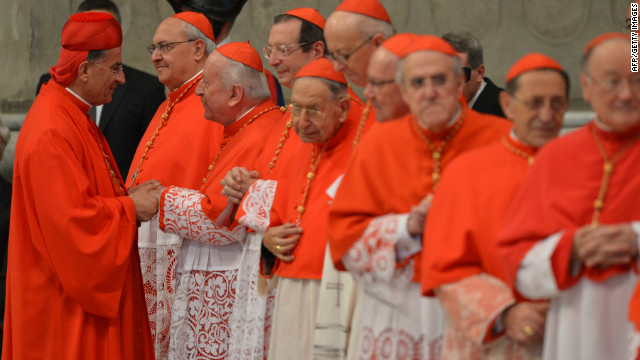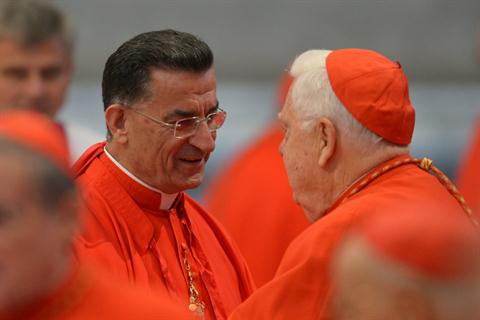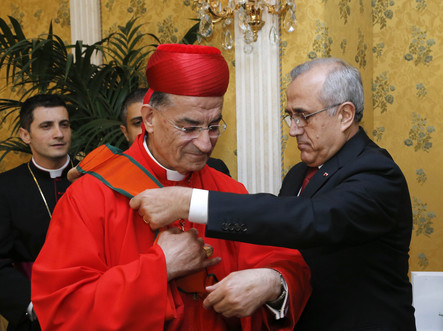Nov24-2012
Pope names six new cardinals with global flavor

Pope elevates Rai and 5 other cardinals
November 24, 2012 10:21 AM (Last updated: November 24, 2012 12:52 PM)By Nicole Winfield
(Retrieved from the Daily Star on 25 November 2012)

Lebanon's Beshara Boutros al-Rai (L) is greeted by US cardinal Bernard Francis Law upon arrival for a ceremony where the pontif will appoint him as one of the six new cardinals on November 24, 2012 at St Peter's basilica at the Vatican. AFP PHOTO / VINCENZO PINTO
VATICAN CITY: Lebanon’s Beshara Rai is among six new cardinals who joined the elite club of churchmen who will elect the next pope Saturday, bringing a more geographically diverse mix into the European-dominated College of Cardinals.
Pope Benedict XVI presided over the ceremony Saturday in St. Peter's Basilica to formally elevate the six men, who hail from Colombia, India, Nigeria, the Philippines and the United States as well as Lebanon. As Benedict read each name aloud in Latin, applause and cheers erupted from the pews.
In explaining his choices for this "little consistory," Benedict said he was essentially completing his last cardinal-making ceremony held in February, when he elevated 22 cardinals, the vast majority of them European archbishops and Vatican bureaucrats.
The six new cardinals "show that the church is the church of all peoples and speaks in all languages," Benedict said last month. "It's not the church of one continent, but a universal church."
That said, the College of Cardinals remains heavily European even with the new additions: Of the 120 cardinals under age 80 and thus eligible to vote in a conclave to elect a new pope, more than half - 62 - are European. Critics have complained that the College of Cardinals no longer represents the church, since Catholicism is growing in Asia and Africa but is in crisis in much of Europe.
With the new additions, the College of Cardinals is a tad more multinational: Latin America, which boasts half of the world's Catholics, now has 21 voting-age cardinals; North America, 14; Africa, 11; Asia, 11; and Oceana, one.
Among the six new cardinals is Archbishop James Harvey, the American prefect of the papal household. As prefect, Harvey was the direct superior of the pope's former butler, Paolo Gabriele, who is serving an 18 month prison sentence in a Vatican jail for stealing the pope's private papers and leaking them to a reporter in the greatest Vatican security breach in modern times.
The Vatican spokesman has denied Harvey, 63, is leaving because of the scandal. But on the day the pope announced Harvey would be made cardinal, he also said he would leave the Vatican to take up duties as the archpriest of one of the Vatican's four Roman basilicas. Such a face-saving promotion-removal is not an uncommon Vatican personnel move.
Harvey's departure has led to much speculation about who would replace him in the delicate job of organizing the pope's daily schedule and arranging audiences.
Aside from Harvey, the new cardinals are: Abuja, Nigeria Archbishop John Olorunfemi Onaiyekan; Bogota, Colombia Archbishop Ruben Salazar Gomez; Manila, Philippines Archbishop Luis Antonio Tagle; and the major Archbishop of the Trivandrum of the Siro-Malankaresi in India, His Beatitude Baselios Cleemis Thottunkal.
Cardinals serve as the pope's closest advisers, but their main task is to elect a new pope.
The six new cardinals are all under age 80. Their nominations bring the number of voting-age cardinals to 120, 67 of whom were named by Benedict, all but ensuring that his successor will be chosen from a group of like-minded prelates.
Saturday's consistory marks the first time in decades that not a single European or Italian has been made a cardinal - a statistic that has not gone unnoticed in Italy. Italy still has the lions' share of cardinals, though, with 28 voting-age "princes" of the church.
Rai is the fourth patriarch from Lebanon to be appointed cardinal, alongside Patriarchs Nasrallah Butros Sfeir, Anthony Peter Khoraish and Boulos Meouchi, who was the first Lebanese to be appointed cardinal in 1965. – With The Daily Star
Suleiman Grants al-Rahi Order of Cedar, Urges Officials to Attend Dialogue
(Retrieved from Naharnet on November 25, 2012)

President Michel Suleiman reiterated on Saturday calls for Lebanese foes to attend the all-party talks, urging officials not to favor any side in the Syrian conflict.
“Everyone should attend the national dialogue and officials shouldn't favor neither the Syrian regime nor the opposition,” Suleiman said after granting Maronite Patriarch Cardinal Beshara al-Rahi the National Order of the Cedar medal, Lebanon's highest honor.
The assassination of Internal Security Forces Intelligence Bureau head Brig. Gen. Wissam al-Hasan on October 19 has raised fears about unrest in the country, which is divided between supporters and opponents of Syrian President Bashar Assad, whose country supervised its small neighbor for nearly 30 years.
The Ashrafiyeh bombing in Beirut that killed Hasan along with two others deepened the gap between the March 14 alliance and the March 8 coalition.
The opposition rejects attending the national dialogue before the government resigns and demands the formation of a neutral salvation cabinet as the only way to defuse the tension in the country.
For his part, al-Rahi called on the Lebanese to seek “to make Lebanon a model country for dialogue, neutral and committed to peace and justice.”
Pope Benedict XVI formally elevated on Saturday al-Rahi and five other prelates at a ceremony that was held at St. Peter's Basilica, bestowing red hats and gold rings on them.
His choice to elevate al-Rahi is seen by observers as a sign of Vatican support for religious diversity in Lebanon, which Benedict said was a "model" for the region during a visit in September.
The pope has called for peaceful coexistence between Islam and Christianity and has said Christians should stay in the Middle East despite rising Islamism.